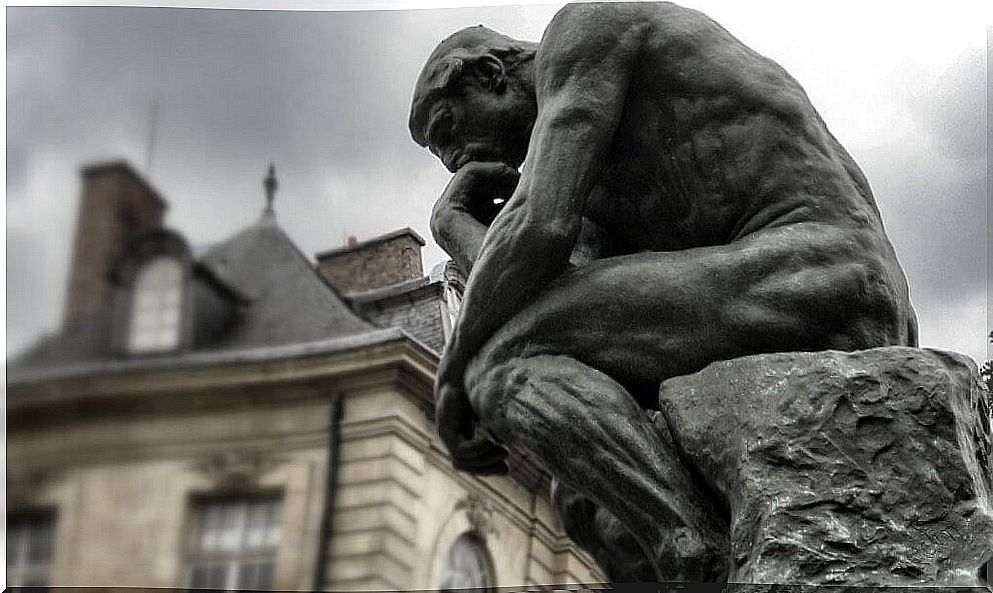Philosophy And Psychology: What Relationship Exists?

Philosophy and psychology are two related fields of study. Psychology arises from philosophy. It was born with the aim of including the empirical method to address the questions that philosophy poses. Philosophy, therefore, has “lent” various topics of study to psychology, such as sensation, perception, intelligence and memory.
The solutions they provide, however, are different. While sharing certain themes, they present different approaches. While making use of the same theories, philosophy and psychology often do not agree in their conclusions. These differences lead the professionals of both fields to see themselves almost as enemies.

Philosophy and psychology
The word psychology comes from the Greek words “psyche” and “logos” which mean “soul” and “study” respectively. Therefore, psychology comes to mean the study of the soul. Thus, in a simple way, we could say that psychology is the science responsible for the study of the human mind and behavior.
It is a field of study that attempts to explain what happens in our black box and how these events affect the way we behave, taking into account the type of stimulation we receive. In this sense, psychology also aspires to know how people receive and interpret information that comes to them through the senses.
For its part, the term philosophy derives from the Greek words “philo” and “sophia”, which together mean “love of wisdom”. Philosophy has its purpose in solving problems that occur in reality.
It focuses on the study of a variety of perhaps more significant problems, such as existence, knowledge, truth, morality, beauty, mind and language. It usually conducts its research in a non-empirical way, whether through conceptual analysis, thought experiments, speculation or other a priori methods.

Analogies between philosophy and psychology
Psychology depends on philosophy for several reasons. Philosophy lends psychology an overview of the human being that is the basis of most psychological theories. The inverse relationship is also true. L in philosophy sometimes uses scientific methodology of psychology to achieve its objectives. They both share theories and also objects of study.
Another similarity is that philosophy has brought some of the issues studied to psychology: sensation, perception, intelligence, memory and will. As mentioned, both share the objects of study, even if the form of studying them and the answers given are different. Furthermore, philosophy introduces itself into psychology in two ways. Through the hypotheses relating to the mind and the appropriate forms of studying it and through the general principles underlying scientific research.
Differences between philosophy and psychology
While both disciplines examine people’s behavior, they also have discrepancies. Some of the points where they differ can be found in the methodology used, in their aims and in the fact of taking morality into consideration.
As for the method, philosophy works with conceptual categories and the relationships that exist between them. Therefore it is open to any method. Psychology, on the other hand, is based on the empirical and statistical method; making use of quantitative and also qualitative research. It focuses on carrying out experiments and empirical testing of hypotheses as a way to understand our behavior and validate the tools, such as therapies, that it puts at our disposal.
As for the goal, philosophy has more intellectual purposes, while psychology turns its gaze on therapy and intervention. Philosophy creates philosophical systems or categories that serve to explain reality. Psychology, rather than studying a whole like philosophy, aims to isolate the variables of human behavior.
His theories, therefore, try to take into account our biology, for example by studying our brain, and to consider individual differences (no one exactly imitates the behavior of another person in the same circumstances). Thus, psychology rarely turns to the search for a totally alien reality of the existence of individuals, something that has historically occurred in some philosophies.

Another major difference between the two disciplines concerns the conception of morality. Philosophy tries to explain everything, which includes studying the correct ways of behaving. There are several works of philosophy regarding what is right and what is wrong. For its part, psychology does not enter into this debate. Although scales of ethics and morals have been proposed in psychology, their goal is not to study what is moral and what is not, but that there are different morals.
philosophy and psychology study human beings and their behaviors. Both present similarities and differences, sometimes formulating different interpretations for the same facts. Thus, the method used by each of them conditions the answers they will give us. Yet both share, on some occasions, theories and results that the other science integrates into its own almanac of knowledge.









